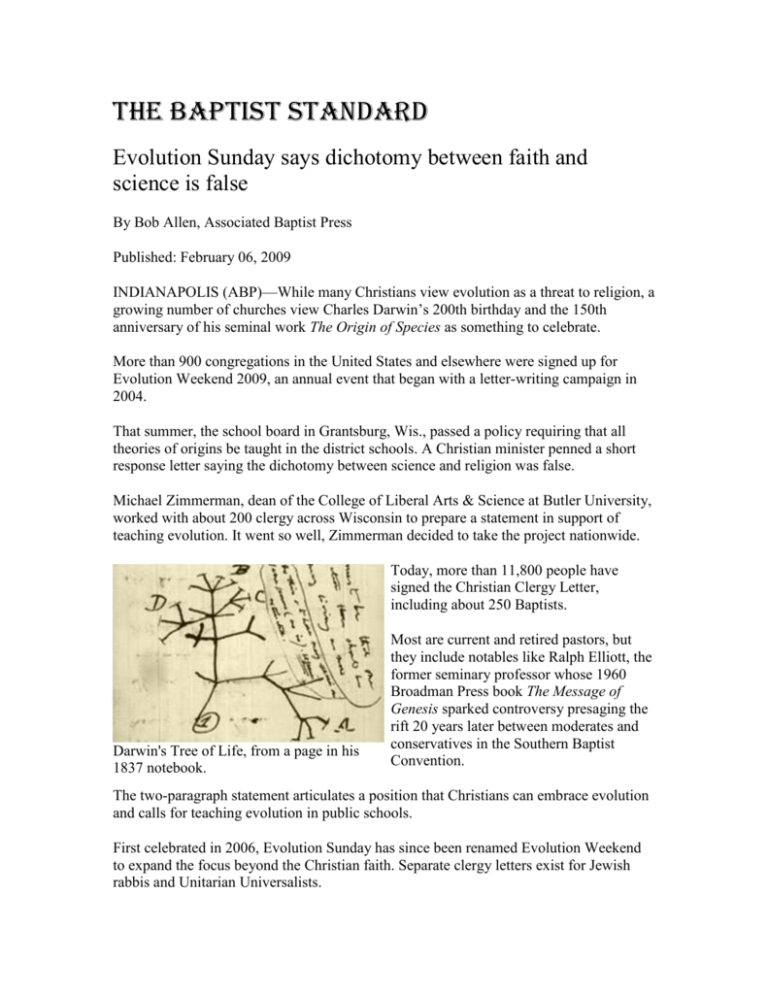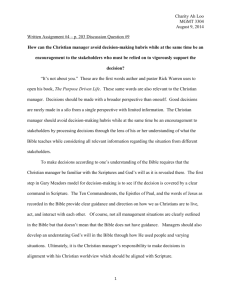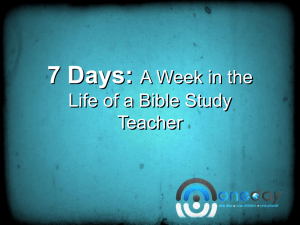The Baptist Standard - The Clergy Letter Project
advertisement

The Baptist Standard Evolution Sunday says dichotomy between faith and science is false By Bob Allen, Associated Baptist Press Published: February 06, 2009 INDIANAPOLIS (ABP)—While many Christians view evolution as a threat to religion, a growing number of churches view Charles Darwin’s 200th birthday and the 150th anniversary of his seminal work The Origin of Species as something to celebrate. More than 900 congregations in the United States and elsewhere were signed up for Evolution Weekend 2009, an annual event that began with a letter-writing campaign in 2004. That summer, the school board in Grantsburg, Wis., passed a policy requiring that all theories of origins be taught in the district schools. A Christian minister penned a short response letter saying the dichotomy between science and religion was false. Michael Zimmerman, dean of the College of Liberal Arts & Science at Butler University, worked with about 200 clergy across Wisconsin to prepare a statement in support of teaching evolution. It went so well, Zimmerman decided to take the project nationwide. Today, more than 11,800 people have signed the Christian Clergy Letter, including about 250 Baptists. Darwin's Tree of Life, from a page in his 1837 notebook. Most are current and retired pastors, but they include notables like Ralph Elliott, the former seminary professor whose 1960 Broadman Press book The Message of Genesis sparked controversy presaging the rift 20 years later between moderates and conservatives in the Southern Baptist Convention. The two-paragraph statement articulates a position that Christians can embrace evolution and calls for teaching evolution in public schools. First celebrated in 2006, Evolution Sunday has since been renamed Evolution Weekend to expand the focus beyond the Christian faith. Separate clergy letters exist for Jewish rabbis and Unitarian Universalists. The emphasis has three goals: • To elevate the discussion on the topic beyond sound bites to meaningful conversation. • To demonstrate that people from many religious faiths view evolution as sound science that poses no problems to their faith. • Along with the Clergy Letter Project, to argue the case that people do not have to choose between science and religion. “Science can’t prove that God doesn’t exist,” Zimmerman wrote in a February 2007 oped piece in the Indianapolis Star. “That’s not what science is about. But for far too long, strident voices, in the name of Christianity, have been claiming that people must choose between religion and modern science.” Because the vast majority of people consider themselves to be religious, Zimmerman says, when forced to choose, many will opt for religion. “People don’t have to choose,” Zimmerman said. “Go to church—whether or not it’s one that celebrates Evolution Sunday. Love God. Believe in religion. But respect science. And keep science and religion separate.” Michael Castle, pastor of Cross Creek Community Church in Dayton, Ohio, said his church, dually aligned with the Alliance of Baptists and United Church of Christ, planned to participate in Evolution Sunday for the third year. “I have found this emphasis to be a good opportunity—and a good reason—to lift up the compatibility and complementary relationship between religion and science,” Castle said. “So many Christians have it in their heads that science is opposed to religion and see science as a threat. I think that religion is most relevant and powerful when it deals with life as it is, not as we wish it to be.” Castle said the first year he prepared for Evolution Sunday, he wondered how his church would respond. The most telling comment came from a member who is a scientist. He told Castle he had never heard a sermon like that, and it made him feel good to know his profession did not make him less of a Christian. In his 2007 Evolution Sunday sermon, Gary McCaslin, pastor of First Baptist Church in Painted Post, N.Y., said it isn’t science that threatens faith but instead “being shackled to a literal interpretation of the Bible that insists on everything being provable.” McCaslin said stories in the Bible are “images” of God described by ancient writers who had no need to provide accurate history or scientific details. “When we try to impose a scientific understanding on subjects that have nothing to do with science, we get in trouble,” he said. McCaslin appealed to the Bible’s “real authority,” meaning that the Bible is true regardless of what science learns about the world or universe. Text of the Clergy Letter Project "Within the community of Christian believers there are areas of dispute and disagreement, including the proper way to interpret Holy Scripture. While virtually all Christians take the Bible seriously and hold it to be authoritative in matters of faith and practice, the overwhelming majority do not read the Bible literally, as they would a science textbook. "Many of the beloved stories found in the Bible—the Creation, Adam and Eve, Noah and the ark—convey timeless truths about God, human beings and the proper relationship between Creator and creation expressed in the only form capable of transmitting these truths from generation to generation. Religious truth is of a different order from scientific truth. Its purpose is not to convey scientific information but to transform hearts. "We the undersigned, Christian clergy from many different traditions, believe that the timeless truths of the Bible and the discoveries of modern science may comfortably coexist. We believe that the theory of evolution is a foundational scientific truth, one that has stood up to rigorous scrutiny and upon which much of human knowledge and achievement rests. To reject this truth or to treat it as “one theory among others” is to deliberately embrace scientific ignorance and transmit such ignorance to our children. "We believe that among God’s good gifts are human minds capable of critical thought and that the failure to fully employ this gift is a rejection of the will of our Creator. To argue that God’s loving plan of salvation for humanity precludes the full employment of the God-given faculty of reason is to attempt to limit God, an act of hubris. We urge school board members to preserve the integrity of the science curriculum by affirming the teaching of the theory of evolution as a core component of human knowledge. We ask that science remain science and that religion remain religion, two very different, but complementary, forms of truth."







